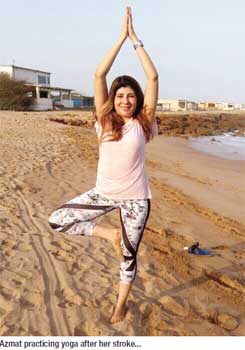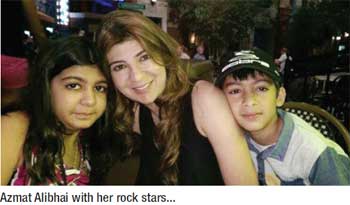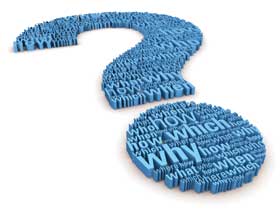Life after a stroke can be challenging. This week You! takes a look at the life of Azmat Alibhai who is not only leading a normal life after surviving a stroke, but has also created a website that aims to spread awareness for others in need. ..
Life after a stroke can be challenging. This week You! takes a look at the life of
Azmat Alibhai who is not only leading a normal life after surviving a stroke, but has also
created a website that aims to spread
awareness for others in need. ..
Istill remember the day when it all happened. One minute everything was fine and the next minute I could not even speak or move. Reality finally struck when I heard my husband frantically repeating to a friend that I was having a stroke. I was taken to the hospital, which is 10 minutes from my home. Upon reaching, I had no recollection. After the treatment for my condition, I had multitude questions - am I going to have another stroke? Prevention, recovery the list went on and on!” recalls Azmat Alibhai, a survivor of cryptogenic stroke.
Basically, cryptogenic stroke is a stroke of an unknown cause. It is estimated that 25 to 30 per cent of strokes are cryptogenic or ‘mystery’ strokes. This means another stroke event can occur if the cause is left unknown. Life after a stroke can be challenging. This is because strokes can cause irrecoverable damage to the body and even if one recovers, it can leave the patient scarred for life. However, the long term effect of the stroke can be minimised if one receives treatment on time.
Azmat Alibhai is one woman who with her will power recovered from a stroke (which occurred last year) and is striving to make a difference. Instead of letting the stroke weaken her, she fought hard to make her condition better. This week You! takes a look at the life of Azmat Alibhai who is not only leading a normal life, but has also created a website that aims to spread awareness for others in need.
According to Azmat, it came as a shock for everyone. “How does a ‘young’ person have a full blown stroke as I did? I don’t smoke; I exercise, eat a healthy diet - how could this happen to me? But it turned out there were no reasons for my type of stroke. Doctors termed it as a cryptogenic stroke, which basically meant there were no known causes.”
Unfortunately, Pakistan still lags behind in providing the required treatment to stroke victims and many people end up suffering for life because of negligence. However, the lack of information and facilities was not seen as a set back by Azmat and she continued in her search for answers. “I spent several months researching, trial and error, discussing stroke with specialists all over the world, spoke to many stroke survivors - basically reached out to anyone who was willing to share information. I had so many questions, so few answers. I was scared of the unknown and PTSD - (Post Traumatic Stress Disorder) became my new best friend,” she informs.
Stroke survivors experience several psychological issues - fear, anxiety, PTSD etc. According to National Institute of Mental Health, the definition for PTSD is a disorder that develops in some people who have experienced a shocking, scary, or dangerous event. “I wanted to speak to other survivors and voice my concerns. However, I found no support. My plan now is to eventually set up a support center,” she says.
“Every day was a new challenge; blood thinners, blood levels, foods to avoid, headaches, and what not. I am so grateful to my very patient and meticulous neurologist for answering questions I was asking!” shares Azmat about her long road to recovery which took 8 months.
Azmat’s recovery was unusual, considering the magnitude of the stroke. Initially the doctors said she would not be the same person. The statistics for total recovery were also disappointing and were around 10 per cent according to the National Stroke Association.
That’s how Azmat Alibhai remembers the one incident that changed her life. Yes, the stroke did change her life. It always does in one way or another. However with some efforts, life could still be lead normally. Within a span of one year, Azmat believes she has achieved at least 80 per cent recovery. That’s not all. The stroke she suffered has set her on a mission. She is now trying to educate her compatriots that there is life after a stroke - a normal life. “Every day I had people visiting the hospital, calling, emailing inquiring about my health. I was very fortunate to have so many people caring and praying for my wellbeing. God listened! However, God also says he helps those who help themselves. I realised early on that it was time to pull up my socks and get to work,” states Azmat, who has not only managed to heal herself after suffering a stroke but is also helping others to cope with it.
“Stroke patients are called survivors, and rightly so. It takes every ounce of courage to motivate and accept the challenges survivors face on a daily basis. But we must do it, not only for ourselves but for our loved ones,” she explains.
After the stroke, Azmat woke up to another world, a different world. “A world where I was dependent on everyone to speak, read, write and walk for me. I was told that I had this condition called aphasia and will require a speech therapist. My husband and kids had to respond to me by a text or WhatsApp messages. I felt helpless and useless. Slowly I devised a system to respond to my text messages. I did word counting and I still do it but not as much. The more practice and determination you have to improve, the easier it gets. I now fully understood the phrase, ‘practice makes perfect’,” she enunciates.
Further on how one can strive to be better, she continues, “The good news is that each one of us has the natural ability to heal. The body can heal itself. It can do so because it has a healing system,” she says.
Once Azmat had made up her mind to somehow find ways and means to lead a normal life, there was no stopping her. It was a tough challenge, though, considering the necessary resources were not easily available in Pakistan. “Sadly there were no resources readily available. I was very fortunate I had contacts all over the world, and they were ready to help and share information. A lot can be done for recovery and I promised myself, if I ever come back to ‘normal’ I would share and create awareness for stroke survivors and their families and hence this website - falij.com.” Her website, launched last month, outlines specific information on modifying lifestyle to increasing your healing potentials. This includes food facts, nutrition, vitamins and supplements, recipes, exercise, physiotherapy, yoga, breathing, meditation, speech therapy, recipes and a directory of hospitals and physicians equipped for stroke treatment.
After being discharged, Azmat had set realistic daily goals for herself. Recovery is a slow process but nevertheless it is attainable. “The countless neurosurgeons and neurologists I had showed my reports to all over the world always asked the same thing, “Is this your MRI?” “Who is the patient” they would ask me. One of them, said, “What did you do to recover?” I explained I do yoga. He now refers his patients to me for yoga therapy and meditation. His patients love the yoga therapy and find it very beneficial. According to experts, yoga helps to improve balance, flexibility, strength, and coordination and furthermore it can help reduce your risk of heart disease and may be the perfect way to relieve migraines, fight osteoporosis and undo the harmful effects of stress. That’s not all. One study showed how yoga increased the flexibility of blood vessels by 69 per cent and even helped to shrink blockages in arteries without the use of medication. According to Azmat, yoga, determination courage, patience, gratitude and plenty of love and support are the main ingredients in the recipe to recovery. “I was blessed with a support system; thanks to my amazing sister and cousin - they ‘took charge’ in every way possible to help me gain control of my life again. They were God sent. Recovery would not have been possible without their help. My husband and my little rock stars aka my kids were brave souls. Myriads of friends and co-workers all over the world were praying and still pray for my wellbeing,” concludes Azmat Alibhai.
For more information visit her website: www.falij.com